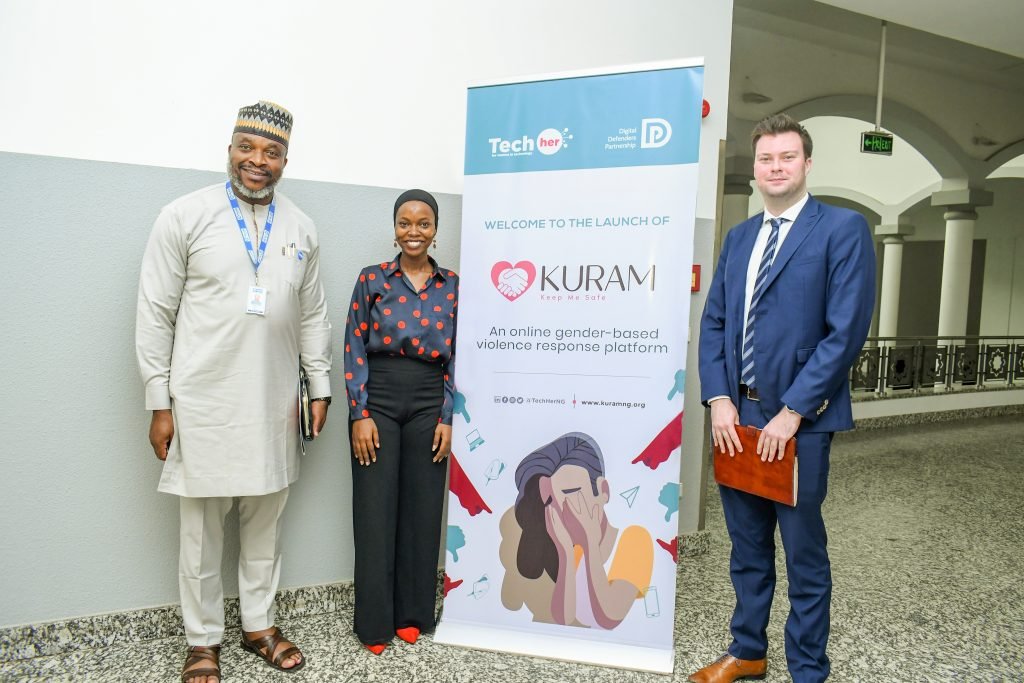
TechHer has launched Kuram, an Online Gender-Based Violence (OGBV) response website designed to provide an avenue for women and other vulnerable groups to report cases of digital violence perpetrated against them.
The launch event, held on Thursday, March 30th, 2023, converged various stakeholders are drawn from civil society, digital platform owners, and the press. Kuram provides various resources critical to addressing OGBV threats affecting different vulnerable groups across gender, sexual orientation, class & background.
Heralded as a timely intervention amidst increasing & diverse forms of gender-based violence in Nigeria, Kuram, which translates to “keep me safe” in Tiv, consolidates efforts with the support of Hivos through the Digital Defenders Partnership to tackle violence perpetrated in digital spaces.
In a goodwill message, Plan International Country Director Charles Usei reiterated the importance of protecting women’s safety online. He highlighted strengthened ties with TechHer to empower women continuously. He reiterated the need for survivors’ justice stories to be shared to encourage others to speak up.
In her remarks, TechHer Executive Director, Chioma Agwuegbo, stated the significance of understanding how rampant OGBV was. She pointed to the need for actionable solutions like Kuram to provide safe spaces for women and other vulnerable groups engaging with internet technologies.
“TechHer has invested a lot of resources to demystify technology for young women and girls through our school tour projects. It is a shame that while we encourage women to access and wield technology more, they are discouraged by the violence perpetrated against them in digital spaces.
“Online violence goes beyond revenge porn; it is bullying, doxing, deep fakes, amongst other forms of violence perpetrated against women and other vulnerable groups on the internet,” she said.
While unveiling Kuram, she emphasized the unnoticed and silent victims of OGBV lost to poor data and the non-availability of avenues to report violations. She spoke on the platform’s ability to collect and store data on digital violence while advancing advocacy efforts and evidence for the remediation of cases.
DIGICIVIC Initiative Executive Director, Mojirayo Ogunlana, bemoaned the fact that far too many citizens, especially OGBV victims, are unaware of their digital rights due to the ambiguity of Nigerian laws. She outlined the simple solution of simplifying relevant laws to boost awareness of internet user rights.
“Simplifying these laws provides a pathway for better understanding and, in turn, helps people be aware that they can seek legal recourse when their rights have been violated online. Several cases have been taken to the courts simply by enabling awareness of personal rights,” she said.
TechHer Women’s Rights & Safety Officer Amina Salaudeen highlighted the work done to facilitate in-person and virtual workshops for over 1000 women and girls nationwide. These training sessions aimed to create OGBV awareness and provide resources, including a homegrown digital security toolkit and sharing relatable stories to encourage victims to step forward.
She emphasised Its role in advancing awareness of OGBV, especially in light of a preexisting gap in proper means of addressing the vulnerability of women in digital spaces. She then explained Kuram’s role in taking the battle against digital violence a crucial step further while providing anonymity for victims.
“It is also more than breaking the silence. Can the identity of victims be kept safe? Kuram is a site that provides solutions for victims without judgment, thus encouraging more people to document their experiences, protect themselves and seek help,” she said.
An interactive session discussed the site’s functionality, especially for Persons With Disabilities (PWDs), and accessible solutions to protect other vulnerable groups. Stakeholders were encouraged to share the website’s interventions within their communities as active players in the fight to end violence against women in all forms. Further calls were made to security agencies and policymakers to recognise and act on the nascent threat of OGBV.








